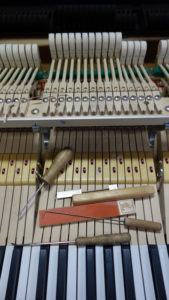
Piano work can be a lonely occupation. Yes, one deals with (hopefully) a stream of customers, many of whom can be quite interesting and some of whom become friends. This connecting with individuals with whom one shares (again, hopefully) a common passion is rewarding and inspiring.
But the work itself is isolated. In fact many people make a specific point of leaving the general area in which a piano technician is working, at least for the tuning part. Tuning of course is difficult to do in noisy environments and takes concentration as well as quiet, so a friendly chat while one is tuning is not really an option.
The other work including regulation, voicing, and repair requires focused concentration and can take extended periods of time during which even the most interested layman usually finds something else to do. After all, if you’ve seen a technician set drop on 2 notes, you pretty much have the idea and there is no reason to watch him or her set the remaining 86. Let’s face it: piano work can be quite tedious and to do it correctly, one must perform an appropriate sequence of steps carefully and evenly, regardless of how one is feeling, or how ones day started out. This can be a demanding profession for all its rewards.
However it is fairly safe to assume that an individual who is a practicing piano technician has come to terms with these facts and has found something in the profession that matches his or her personality. The quiet, the mechanical and musical aspects, the practicing and continued development of skill and the satisfaction of a difficult job well done all add up. If one plays at all there is an additional pleasure in witnessing an instrument progress musically as it progresses technically.
There is a great reliance on self discipline that can be both rewarding and a source of great anxiety. If one makes a mistake, say easing a hammer flange a little too much, or shaping a hammer tail a little sloppily, it is quite unlikely that someone else will ever notice it and once a tech realizes this, the temptation for sloppiness appears. This is where the importance of ones teacher comes in. The first teacher one has in this trade plays a critical role in determining how skilled a technician will eventually become. If the first teacher sets a high bar for excellence, the student will always feel like this demanding but benevolent (or not) master is looking over his shoulder. I work expecting one of my early teachers to be the next person to see this piano. Sloppiness was not tolerated.
In my case the problem comes from the fact neither of those two individuals is actually going to see my work which tends to make me crazy with apprehension and anxiety. After all, since they will not see the work or comment on it, I never get their feedback on how good a job I actually did and with my propensity for self criticism, this can be a problem.
Another aspect of piano work is that there is huge room for variation within the framework of a functioning piano. Tuning and voicing have great latitude for an individual to exert his or her preference, individuality and ability, all while staying “within the lines”. Piano work at a high level is a fascinating combination of creativity within a very strict structure. One really can’t be creative when setting key level but tuning and voicing are areas that often separate the good from the great.
One must find a place where the tedium and discipline find balance and the foundation is built for creative expression. One must find reward in the details and the repetition and the time spent and the dialog with invisible critics. The technician needs to find a reward from the result, regardless of the quality of the piano or the client. At its best, it is a form of mindfulness that allows one to learn about ones self, a path for introspection and self awareness. Tuning, regulation and voicing can be looked at as a type of meditation, an opportunity to clear the mind and concentrate on the here and now, the task at hand.
But regardless of enlightenment, the result had better feel and sound right.